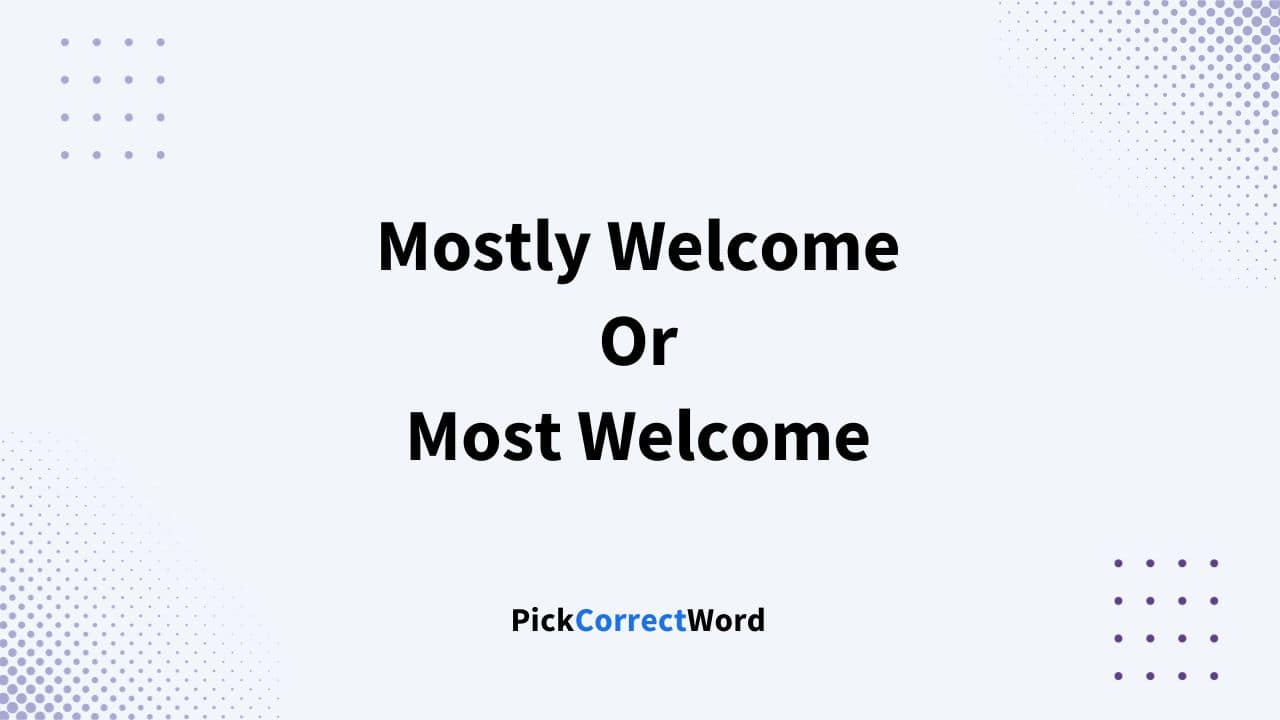When you’re looking to greet someone warmly, you might be unsure whether to say mostly welcome or most welcome.
“Most welcome” is a phrase that most people use to show appreciation for appreciation. The word “welcome” is emphasized to the highest level.
But “mostly welcome” isn’t used this way very often, which can be confusing for people learning English. It sounds like a restriction, like “largely welcome but not completely,” which goes against how we want to feel when we say “thank you.”
Mostly Welcome or Most Welcome: Which is the Correct Usage?
When you’re replying to a thank-you, the conventional response is “most welcome,” not “mostly welcome.” Let’s talk about why “most welcome” is the right answer instead of “mostly welcome.”
Difference Between “Mostly” and “Most Welcome”
Being the best is what the word “most” means. It makes the word “welcome” more important in this situation.
The term “most” acts as a superlative adverb. It elevates the meaning of the word “welcome” in this context.
On the other hand, “mostly welcome” isn’t a common phrase, and it can cause confusion. “Mostly welcome” suggests that you’re somewhat but not completely welcoming someone. Let’s clear up the distinctions:
This phrase means that someone’s arrival or help is very much appreciated.
Most welcome: This phrase is used to show that someone’s arrival or help is received with the highest degree of appreciation.
Mostly welcome: This isn’t standard English; it implies that you’re welcoming someone but with certain reservations.
Examples:
- After someone says “thank you,” we say “You are most welcome” to assure them of our sincere gratitude.
- At an open house event, we might tell guests, “You are most welcome to join us.”
Usage: Formal and Informal Situations
As we delve into the correct usage of “welcome” in English, you’ll focus on understanding when to use “most welcome” and when other expressions might fit better, depending on the situation.
Formal Situations: When someone says “Thank you,” it’s proper to reply “You are most welcome.” This shows that you are very grateful for the thanks.
For example, in a business meeting or after giving someone significant assistance, this expression can mirror respect and courtesy.
Other formal responses you might commonly use include:
- Certainly
- You are most welcome
- It was my pleasure
- Don’t mention it
- I’m happy to have helped
- Glad to be of assistance
- Happy to be of service
Informal Situations: In informal or casual interactions, you often use a range of other expressions to communicate the same feeling in a less formal way.
Other informal responses you might commonly use include:
- No problem
- Don’t worry about it
- Anytime
- That’s all right
Examples of Using Most Welcome in Formal Situations:
After a Business Meeting: “Thank you for your time and input during today’s meeting.” “You’re most welcome, it was a productive discussion.”
In Professional Correspondence: “Thanks for sending over the report so promptly.” “You’re most welcome, happy to assist where I can.”
During a Conference: “Thank you for your enlightening presentation.” “You’re most welcome, I’m glad you found it useful.”
After a Formal Dinner: “Thank you for the wonderful dinner.” “You’re most welcome, it was our pleasure to host.”
In an Academic Setting: “Thank you for your guidance on my thesis.” “You’re most welcome, I’m impressed by your dedication.”
Examples of Using Most Welcome in Informal Situations:
After a Casual Lunch: “Thanks for picking up the bill this time!” “You’re most welcome, it was my turn anyway.”
At a Friend’s House: “Thanks for letting me crash at your place.” “You’re most welcome, any time you need.”
During a Casual Conversation: “Thanks for the advice.” “You’re most welcome, glad I could help.”
At a Party: “Thanks for the invite to your party.” “You’re most welcome, glad you could make it.”
After a Favor: “Thanks for covering my shift.” “You’re most welcome, we all need a break sometimes.”
Frequently Asked Questions
What does the phrase ‘most welcome’ signify in a social setting?
When used in a social setting, “most welcome” means a lot of appreciation and acceptance. It makes it clear that someone’s presence or thanks is very much appreciated.
In what contexts might ‘you are very welcome’ be preferred over ‘most welcome’?
In less formal situations, “You are very welcome” might be better. It’s a sincere and friendly answer that doesn’t require the extra formality of “most welcome.”
Could ‘almost welcome’ be considered a proper response in any situation?
It’s not proper or appropriate to say “almost welcome” in any situation. It makes you feel hesitant or unwilling, which is not the message you want to send of gracious acceptance.


